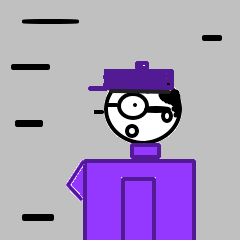She gazed, smoking, out at the smoky barroom and Milford realized that in the preceding confusion he had left his own most recent cigarette burning in the ashtray at the bar, and that it was therefore incumbent upon him now to light up another. It was true, this situation was awkward, and there was nothing to be done in any awkward situation but to light up a cigarette. He dug out his pack of Husky Boys and his Ronson, and soon enough, after clicking the lighter no more than six times, he had a cigarette ignited and in his lips, and as he appreciated the hot rasping feeling in his weak and ravaged lungs it occurred to him that every single and general situation in his life had been awkward, up to and including this present moment.
No wonder he had so many nightmares, because science had not yet devised a way to allow human beings to smoke while they slept.
The woman named Margaret Blackbourne now steered her gaze toward Milford.
"I like it that you know how to remain silent. It's a rare quality in any man, the ability to keep his thoughts to himself, rarer still amongst poets, and all but nonexistent among so-called lost poets. Of which cohort I assume you are one."
"It's true I am lost," said Milford, after a minute's pause, while another sad song sung by a sad woman played on the jukebox and the ghostlike figures in the bar babbled. "But as for being a poet, I realized today that I have only written bad poetry."
"So you are a lost bad poet."
"Yes," said Milford, after a shorter pause. "I would say that is an accurate description."
A man emerged from the smoke and stood at their table.
He wore a long dark cloak-like coat, and a Greek fisherman's cap. His skin was pale grey, his cheeks hollow, as were his eyes, on either side of a nose that was long and sharp. His face was stubbled with dark whiskers, and he held a brown cigarette.
"Why do you torture me, Margaret," the man said.
"Why do you torture me, Theodore?"
"I torture you only because you torture me."
"Exactly the same reason why I torture you," she said. "Oh, by the way, Milvern is it?"
"Milford actually," said Milford.
"Milford," she said, "meet Theodore. A fellow lost poet."
"I prefer the term poète maudit," said the man.
"No one cares what you prefer, Theodore," said Margaret.
"Hello," said the man to Milford.
"Hello," said Milford. He stood up awkwardly and awkwardly extended his hand, but then realized he was holding his cigarette in that hand.
He quickly shifted the cigarette to his left or non-shaking hand, and re-offered his right hand.
"I will accept your handshake," said the man, "but only grudgingly and because I don't want to make a scene."
They shook hands, and, thank God (in whom I fervently and now more than ever do not believe, thought Milford), the man's handshake was weak, even weaker than Milford's, which was certainly weak, from a lifetime of taking no exercise more vigorous than the lighting of cigarettes.
"Pleased to meet you," said Milford, withdrawing his hand with a slight slithering sound.
"I wish I could say the same," said the man. "I hope you know that Margaret will destroy your manhood."
"Well, we've only just met," said Milford. "But–"
He paused.
"But what?" said the man called Theodore.
"But I'm not so sure I have a manhood to destroy," said Milford.
Now the man paused, as Milford stood there, awkwardly.
"Damn you," said the man, finally. "Damn you and all your kind."
"If you're wishing me to be damned to hell," said Milford, not knowing what he was going to say, "that may well happen, if there is a hell, and if if men are to be damned to it for being lazy talentless layabouts."
"Damn your eyes," said the man. "If I were not a coward I should slap you, not just once but twice, one with open hand and one back handed."
"It's always good to meet a fellow coward," said Milford.
"Yes, that's true," said the man. "Perhaps not good, but not bad." He turned to Margaret. "I'm almost starting to like this fellow, Margaret."
"What?" she said.
"I said I'm almost starting to like your new paramour."
"Who gives a damn who you like or don't like, Theodore?"
"It should be 'whom' I like or don't like."
"Oh, fuck off."
"I beg your pardon."
"I said fuck off."
"Do you mean that in the physical sense, or the metaphorical?"
"I mean it in every possible sense."
"You're saying you want me to quit your presence."
"Yes."
"Very well. If you want me to leave, I shall."
"Good."
"Don't beat about the bush, just say it."
"Fuck off."
"Just say it and I'll never trouble you with my presence again."
"Okay," said Margaret. She took a drag of her cigarette, exhaled a great cloud of smoke, and then repeated, "Fuck off."
"Oh," said the man. "And you really mean that?"
"Yes," she said.
"Okay, fine, I'll leave then, gladly." he said. "But first, here."
He reached into the depths of his cloakish coat and came out with a folded-up sheet of paper. He unfolded it and proffered it to Margaret. She ignored it.
"It's a poem," he said.
"Why am I not surprised?" she said.
"Do you want me to read it to you?"
"No," she said.
"Okay," he said. "I'll just leave it on the table here."
He placed the sheet of paper on the table.
"You can read it whenever you get a chance, a spare moment."
She said nothing.
Milford was still standing there, awkwardly.
"You can read it too, Millibrand," said the man. "You seem like a sensitive guy."
"Oh, okay," said Milford. "Thanks."
"You're welcome," said the man. "But please bear in mind that I just wrote it not five minutes ago, so it might still be a bit raw. I might need to do a few small revisions."
"Okay," said Milford.
"I am a great believer in the first bold flush of inspiration, and yet even the most brilliant effusions sometimes need a bit of rewriting, a slight touch of polish. Don't you agree?"
"Yes, I suppose that's so. But then also I suspect that no amount of rewriting or polishing can save something that was essentially rubbish from the start."
"An interesting thesis, but I am not sure I agree."
"I'm not sure I agree either," said Milford.
"Nonetheless, I'd actually be interested in hearing your thoughts."
"My thoughts?"
"Yes."
"About –"
"About my poem."
"Oh, right, sure."
"What did you say your name was again. Melliford? That's an odd name for a first name."
"I, uh," said Milford.
"Theodore," said Margaret.
"Yes?" said Theodore.
"Fuck off," she said.
A waitress came over, carrying a round bar-tray under her arm. At least Milford assumed she was a waitress, as she wore a black apron over her pale grey smock.
"Do you want me to find you a chair?" she said to Theodore.
"No, Ruthie," said Margaret. "He's not staying."
"I wouldn't mind sitting for a bit," said Theodore. "We could read my poem, and then discuss it."
"I would rather punch myself in the face," said Margaret. "Repeatedly."
"We don't have to read the poem right now."
"Don't make me put this cigarette out in your hand, Theodore," said Margaret.
"I wish you would," said Theodore. "I should wear the scar like a badge of honor."
"I wish I had a drink so I could throw it in your face," said Margaret.
"Speaking of which," said the waitress, "can I get you a drink, Margaret?"
"Sure, Ruth," said Margaret, "tell Thumper I'll take my usual, and better bring my friend Milburn here another glass of beer."
"Oh, that's okay," said Milford, "I don't want another beer."
"Bring him what I'm drinking then," said Margaret.
"I would like an absinthe," said Theodore.
"I'm sure you would," said Margaret, "but you're not drinking it at this table."
"So you would really like me to go."
"Yes," said Margaret.
"You know, I wrote that poem for you."
"I have no doubt."
"Poured out my heart and soul."
"Milbert," said Margaret.
"Me?" said Milford.
"Yes, whatever your name is, if this fellow doesn't leave at once I want you to punch him. I would do it myself, but I like to think I am a lady."
"But," said Milford.
"But what?"
"I have never punched anyone in my life."
"Then it's high time you learned how. Give him a good hard right to the breadbasket, that way you're less likely to hurt your hand."
"All right, all right, there is no need for violence, I'm going," said Theodore. "Ruthie, would you please bring me another absinthe to my table, with another small carafe of water? Oh, and I may need some more sugar cubes."
"Sure, Teddy," said the waitress, and she walked away.
"Well, okay, I'm going then," said Theodore.
"Goodbye," said Margaret. "And good riddance."
Theodore addressed Milford again.
"Let me know what you think of the poem. I'll be sitting across the room there with some other chaps, they're all poètes maudits as well."
"Uh," said Milford.
At last the man went away, into the smoke.
"You can sit down now," said Margaret.
"Oh, right," said Milford, and he took his seat again.
The sheet of paper was lying right there. It was covered in scrawled ink. Idly Milford turned the paper with his fingers so that the writing was facing him. Centered at the top of the page were written the words

























No comments:
Post a Comment